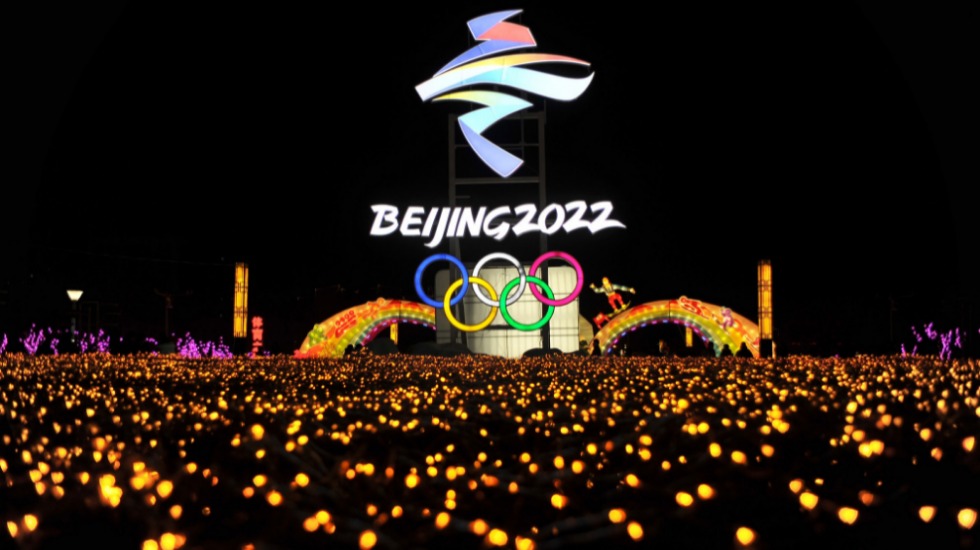The 2022 Winter Games are some $60 billion cheaper to stage for China compared to their 2008 Summer equivalent. Photo: GETTY IMAGES
In 2008, I attended the Beijing Summer Olympics.
In fact, on the evening of the opening ceremony, the then Prime Minister Kevin Rudd, a Mandarin speaker, launched my book on the economics of sport, Going the Distance, at the Beijing Hilton and the Australian Olympic Committee (AOC) supremo John Coates presented the first copy of the book to champion swimmer Stephanie Rice, as she had won the first Australian medal of the Games and the 400th gold medal ever by an Australian athlete.
These were heady times. Austrade’s Business Club Australia (BCA) was the headquarters of sports networking at Beijing 2008, with Australian exporters of all shapes and sizes doing business successfully in China.
And you could see the Australian influence everywhere at Beijing 2008, with the amazing ‘water cube’ facility produced by John Bilmon, the bird nest stadium, the AstroTurf in the hockey stadium supplied by Australians and the transport and logistics supplied by Linfox.
Many of these business deals had been set up at the Sydney Olympics in 2000, with a long gestation period to Beijing 2008.
See in fact, BCA found that an estimated $1.7 billion worth of deals in trade and investment were generated by these networking events between Sydney and Beijing.
Times were good then. The China-Australia bilateral economic relationship was at its peak, as China was just about to overtake Japan as Australia’s No.1 export destination, we had a prosperous LNG deal, iron ore exporters were going gangbusters, and over 10,000 small and medium enterprises were exporting to China either directly, or through Hong Kong and 3000 Australian businesses had an office there.
The Chinese leadership was confident and open, keen to showcase China to the world, and very much an enthusiastic global player. And Australia was a key partner to China’s positive globalism.
In 2022, with another Beijing Olympics upon us – this time in the winter – things couldn’t be more different. There are global tensions, China’s positive globalism has been replaced by a return to the authoritarian leadership of yesteryear with its ‘President for life’ Xi Jinping, and Australia is no longer the most favoured friend like it was in 2008.
Sure, like in 2008, hosting the Olympics is important to China in terms of showcasing its economic and technological credentials to the world as a player on the global stage but the times are different now compared to 2008 when there was less geopolitical tension and whilst we had a global financial crisis (GFC) to handle then, there was no pandemic.
This makes hosting a global sporting event more problematic, and as we saw in the Tokyo 2020 Summer Olympic Games (albeit held a year later in 2021), there is less domestic public support for the Games due to fears of COVID contagion.
Many in Tokyo felt the government should have put more resources into the pandemic rather than the Games, especially given that locals were largely locked out of the stadium and other venues.
So why is Beijing hosting the Olympics, especially given the uncertainty in world affairs and COVID? Is it worth it in terms of economics? After all, even before COVID hit, there was mounting evidence that hosting the Games came with a significant price tag.
According to Oxford University nearly every Games has overrun its budget since the infamous 1976 Montreal Olympics (that caused long-term financial problems for the city of Montreal), with an average overrun of 252 per cent (adjusted for inflation).
The only exception was Los Angeles 1984 which as the only bidder, negotiated a favourable TV rights deal from the International Olympics Committee (IOC).
With growth of the number of Olympics sports, which has grown three-fold since the 1960s, the huge increase in infrastructure and operating costs, and the increased number of countries participating, hosting the Olympics has now become out of reach for all but the wealthier economies.
The large infrastructure costs of the Rio 2016 Summer Games ($20 billion or A$28.6b) and Sochi 2014 Winter Games ($50 billion or A$71.5b) for Brazil and Russia respectively, highlighted this risk to host nations.
The elaborate bidding process, almost a financial beauty contest to impress the IOC to win the Games, saw costs escalate out of control like an arms race. And whilst the costs overran, hosts still claimed benefits in terms of economic growth, employment, investment and tourism, although economists debated to what extent Olympic spending did ‘crowd out’ tourism spending that would have taken place anyway.
PLEASE HELP US CONTINUE TO THRIVE BY BECOMING AN OFFICIAL FOOTYOLOGY PATRON. JUST CLICK THIS LINK.
Certainly there were some trade benefits, particularly savvy hosts like Sydney 2000 that set up BCA to generate trade and investment around the Games (the ‘power of schmooze’).
The costs associated with the bidding war have now been acknowledged even by the IOC, who now allocate the games to established hosts (like Paris 2024 and Los Angeles 2028) and see the host city using existing facilities to host the games rather than having to invest in a massive infrastructure spend as has been the case in the past.
Brisbane 2032 was looked at favourably from both Brisbane and the Gold Coast both having hosted the Commonwealth Games and having a high standard of sports infrastructure on the south-east Queensland corridor from the Sunshine Coast down to the Gold Coast.
But are the Winter Olympics different? Compared to summer it’s a bit cheaper. The official budget for the 2022 Games is just $3.9b (A$ 5.6b) compared to $45b (A$64.3b) for the 2008 Summer Olympics.
It’s on a smaller scale with fewer countries and athletes. And in 2022, it will rely on domestic Chinese tourism given COVID and China’s border controls. Is there any risk of a cost blowout? Beijing has had to use fake snow and some complex water delivery systems that could be both financially and environmentally risky, although Beijing also wants to demonstrate China’s green credentials in renewable energy.
And of course, a COVID outbreak in the Olympic village or beyond poses a major risk as we saw in Tokyo.
So given these risks, why does Beijing 2022 matter to China? Like 2008, it’s for global prestige, although in 2022, it’s more about China showing it can go it alone in the world more than joining the world.
But there are benefits from Chinese athletes working with international coaches, given increased interest in winter sports amongst the Chinese population.
The Chinese Government has also used the Winter Olympics to invest in poorer mountainous areas in northern China, to boost local jobs and domestic tourism. Some 400 ski resorts were built across China between 2014 and 2017 with a goal of 803 by the time the Games commence together with over 654 skating rinks.
The Games are principally for domestic consumption in terms of tourism, local infrastructure and jobs.
Will the 2022 Winter Olympics help China’s ‘soft diplomacy’? COVID has limited its wins in this regard and the diplomatic boycott won’t help but the athletes and the local tourists will largely be unaffected by the boycott.
The bottom line for this Games is to develop the winter sports industry in China, for domestic consumption and investment and cheer the Chinese athletes on. And if they can get through the games largely COVID free, it will be deemed a success.
But for Australia, participation is nothing like the magnitude of Beijing 2008, in terms of trade and investment. Unlike the China of 2008, China in 2022 under Xi Jinping is all about the domestic economic opportunity to China, particularly in the impoverished mountain areas.
And unlike liberal democracies, where the voters can punish governments for spending too much on an Olympics, this is not an issue in China, but Xi still has to keep his people happy, and the Chinese interest in winter sports is part of the equation, as well as national pride in hosting both the Summer and Winter Olympics in the national capital.
Will the Winter Olympics ‘thaw’ the frosty relationship between Beijing and Australia? It’s likely to have very minimal impact in terms of trade and investment, and diplomacy, and at best, it won’t do any more harm. And a neutral outcome, in today’s cold diplomatic climate, is a pretty good outcome.
*Tim Harcourt is Industry Professor and Chief Economist at IPPG at University of Technology Sydney (UTS) and host of The Airport Economist, The Big Picture and Footynomics – The Economics of Sport
Do you want to study Sport Management at UTS? Check it out at: https://www.uts.edu.au/study/business/i-want-study/management/postgraduate-options/why-sport-management











